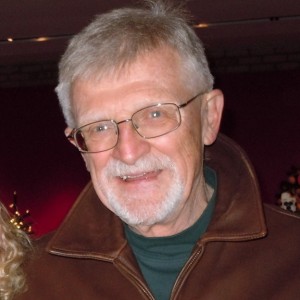Remembering Rich
- Share
- Tweet
- Pin
- Share
Editor’s note: After he retired as Professor Emeritus from the University of Illinois-Springfield in 1995, Rich Shereikis and his wife Judy bought a summer home on Washington Island, where Rich spent his final years. In 2012 he was diagnosed with pancreatic cancer. He died on March 29, 2013. His Washington Island friends contributed to this remembrance.
When a friend dies you hear yourself and others talk about losing him. You hear someone say, what a hard loss. . . and it seems everywhere true. The places where you’d met with him have lost light. Conversations don’t hold the same interest, they’ve lost vigor, sound somehow flatter. While you endure these sharp reminders of mortality, you can’t help but think about the grief that is encompassing his family who have lost so much more.
Then consider that your friend was here one season, lost the next. His abrupt death seems to double the sadness for all who have loved him. You feel as though you’ve lost not only him, but the chance to say goodbye.
But if you’re lucky enough to have had someone like Rich Shereikis in your life, there are also those moments which remind you how depleted hearts still hold the power to be grateful, to be lifted by the gifts he left us. You learn this as stories about Rich begin to be shared.
A few weeks after Rich died, Mari Anderson wrote: “More than any one event in our friendship, what stands out for me is the accumulation of 15 years of dinners, coffee shop chats, visits to their home in Evanston, hot tub summits, dog fostering, and house lending that combine to take up so much space in our hearts. It’s a great gift to have someone in your life who gets righteously indignant about all the same stuff. With humor. With passion. With the ability to write about it honestly and unpretentiously.”
Like Mari, Martha Wagner wants to remember how staunchly Rich stood for principle. He wrote in defense of gay rights in the Washington Island Observer, not something easily done in a small town. She recalls that he relentlessly stood up for another owner, a neighbor of the Wagners and the Shereikis’s in Evanston who suffers from mental illness, when the condo association took steps against her.
Another friend, Barbara Greenfeldt, offers examples of how deft yet humble Rich was as Chairman of the Editorial Committee for the Observer. She admires how he adhered to deadlines and edited from a long distance with his far-flung members, a formidable task on its own. At the same time Rich was able to raise the paper’s standards for content and style, a contribution he was intent on making for the Island community he loved. “We want to be a responsible newspaper,” one of his notes to her read, “sensitive to the realities in a tight-knit community.”
Barbara points to some of the correspondence he had with the committee that helped to accomplish this: “. . .the threads are beginning to tangle as more responses come in. Barbara put her finger on the problem of trying to edit long distance by committee: the process could be endless, with everyone tinkering and tweaking without ever having a chance to discuss issues and reach consensus. And the problems with communal editing are compounded when at least one of us (me) is a pretty hopeless technophobe who doesn’t know a Word from an Apple, doesn’t know how to do multi-colored, interlinear editing and isn’t very teachable about such things.” Ever humble, but also funny, he leavened the pressures of editing.
“I was just trying to get some balls rolling with the things I wrote earlier. I didn’t expect them to become 100-pound medicine balls, rolling back at me, ” he wrote to his fellow editors.
He showed his respect for Observer readers by letting them know why and how policies at the paper were changing: “It might be good to let readers know we are thoughtful about what we’re doing with the paper. . .it might also enhance our credibility if readers knew we deliberated about what goes in the paper.”
He did all this when his health was challenging him. He only briefly alluded to his cancer therapy struggle with the committee members. “Hi All,” he wrote, “I’m on a little vacation from the chemicals now. . .so Judy and I just keep tackling each day as it comes.”
Barbara Greenfeldt sums up her working experience with Rich by saying, “You never had to worry whether he was saying what he meant.”
Mari echoes how Rich’s deep sense of humility was combined with exceptional achievement: “I remember, years ago, how surprised Rich was when I asked him to be a guest presenter at a meeting of the Washington Island Writer’s Society. As in, ‘Me? Why?’ It took awhile to talk him into it, and the event, of course turned out to be delightful, memorable. He read his Christmas letter parody and several excerpts from articles and movie reviews he’d written while in Springfield. I don’t think even he realized what a body of published work he’d accumulated.”
When asked about how he remembers Rich, Gene Callahan says, “ He can best be described as a Mensch, a man with soul.” You think about what it means to be a man with soul. You think about transcendence, Rich’s way of lifting up moments. The countless times he could enrich a conversation, raise the standards of a project, soften a painful moment or heighten the appreciation of a fine thing like a book, a ballgame, a song, even a bike ride on East Side Road or that really good meal. And then Mary Jean brings you back to the room saying, “he was dear to us.” And you feel the warmth of a long friendship.
Rich’s skill with language was the way he elevated the ordinary. Whether he was sharing a ferry ride in late summer, engaging in small talk over an afternoon cup of coffee at the Red Cup or chairing one of those Observer Editorial Committee meetings, the experience would be more memorable for his companions because of him.
Crossing Death’s Door with the Shereikis’ years ago, Barbara Kriegsmann discovered their mutual admiration for the writings of William Maxwell. Shortly afterward, Rich gave her a copy of his published essay from 1987 titled “The True Midwest.” An unexpected gift, beautifully written, that expanded her appreciation for a favorite author. Rereading the essay after Rich’s death, she can’t help but see parallels in the descriptions of Maxwell with her own estimation of Rich. In the essay, he emphasized Maxwell’s tolerance and generosity of spirit. “His power lies in his ability to render the texture of his characters’ lives, to show their suffering and their essential decency,” Rich wrote, admiring Maxwell’s ability to depict a small-town world with “balance and sensitivity,” qualities that Rich himself displayed. She sees in his writing that Rich responded to sad and tragic events just as Maxwell did – with the most beautiful language. After reading this critical essay again, Barbara knows just how lucky his students are to have had him as their literature professor.
On that same ferry ride, Rich shared experiences with Greg Kriegsmann about the challenges of upgrading academic departments in their different universities and disciplines. They talked about life in Evanston, cultural events and politics in Chicago.
It’s no surprise that Rich could switch gears so easily. Pat Wright calls him “a great conversationalist” because of how varied Rich’s interests were, how much he enjoyed exchanging ideas.
Each and every one who contributed to this essay pointed to the pleasure of Rich’s wit. His humor served as much more than an asset to his conversations – he also composed rhymes and limericks that left you laughing out loud. One of these was read at an Island Book Club meeting in April. It was given to Ann Lennon and highlights how the earlier closing of the Red Cup marked “Fall’s Surest Sign.” One of the stanzas follows: “But people who look for an afternoon fix/In a place free of iPods and wi-fi’s and twits/Will miss all the chatter, the gossip and laughter/ If connecting with folks is a thing that they’re after.”
Rich would be pleased to know that the full recitation of his doggerel provoked more laughter than sadness, even though it was only a few weeks after his death. It wasn’t just the humor of his words, it was the feeling that he was somehow present in the room.
Anyone who spent time with Rich and Judy was witness to their abiding love and couldn’t help but be impressed by their partnership. They sustained one another, complemented each other. Judy’s sweet, soft-spoken manner. Rich’s quick wit. They were such a good team together, so charming and warm, that some of us found ourselves unlikely volunteers for Island projects they supported, such as the Music Festival. But they were partners who extended themselves far more than ever expected for their friends, offering their home to Mari for her family, their extra bedroom in Evanston for Barbara and Greg when they were visiting Northwestern University and so much more.
There was never any doubt about how much joy he found with his family. Martha says that one of her most delightful memories is of watching Rich with his granddaughter, Anya. “Grandpa Rich loves me,” she told Martha, as Rich beamed. When he and Judy hosted the extended family on the Island, his smile was broader than ever and you could find him watching from a bench as Anya and Judy ran up the rocks at School House Beach. One of the many images that shine in memory.
There’s still so much that Rich has left his friends. The stories are sure to continue. They are a comfort and a reminder that he is not lost to you. Rich touched you in ways that are impossible to forget and made you better for the time he spent with you.
Contributors: Mari Anderson and Fritz Damler, Gene and Mary Jean Callahan, Barbara Greenfeldt, Barbara and Greg Kriegsmann, Ann Lennon, Martha Wagner, Pat Wright and Dave Ranney.


